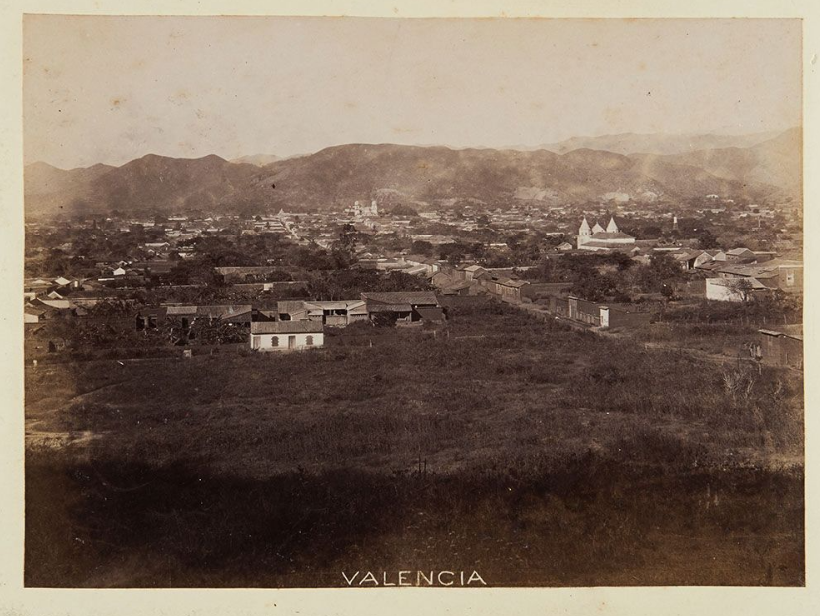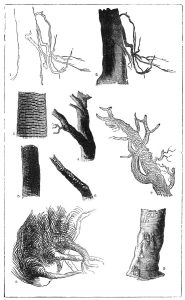43
No 13 Valencia, Venezuela
17th May 1891
My dear Mother,
Some time after your letter of 12th April came the belated dispatches of 23rd & 29th March – the missing links of your to-be-relied on welcome weekly chain.
I have just arrived here & as it is Sunday the offices are closed, but tomorrow I hope to receive a fresh mail.

In Carácas I remained for nearly, – no, fully, three weeks, & I was tired of the place & glad to leave it. It is a fearfully expensive town, & good English sovereigns, which one is accustomed to look upon with a complacent conviction of their lasting solidity melt into nothingness with a slippery rapidity greater than that of the ice cream which threatened to become “all sauce” before its time. One has positively no pleasant sense of possession of them. They jingle once in your pocket & are gone, like a tale that is told, – not a serial story in penny weekly numbers, but short as the tail of Mark Twain’s cow, which looked like a “bananer”.[1] My room in the hotel cost 16/- a day, washing on the basis of one franc a shirt, cabs six shillings & something a drive or an hour, drinks at Sahara prices.
From La Guayra to Puerto Cabello I travelled with a Spanish Opera Company – a fifth-rate gang & a most unsavoury crowd.[2] I was lucky enough to find a quiet spot & a comfortable deck-chair on the steamer, behind the wheel & as the night was very warm. I did not go below at all, but smoked & slept in my chair alternately.
In Puerto Cabello I spent one evening with my kind friends, the Rodriguez family, & we played whist! Young Mrs Rodriguez had never played before, & my partner, Miss Rodriguez, persistently trumped my best cards, – not eights & nines, but kings & queens, – whereat I smiled & tried to look gratified.[3]
In the train this morning,[4] coming up to Valencia there was a pretty girl sitting opposite to me. At least I thought her pretty until I went out to smoke a cigarette &, coming back, found that she had calmly taken possession of my seat on the shady side of the carriage, leaving me to sit in the sun, & then I discovered that she was positively plain-looking. I offer this anecdote gratis to the Society for the Suppression of Cigarette-smoking. The moral is obvious.
There is not much change in these places since I was here before. Two Presidents have come & gone, the electric light has been introduced, & the proprietress of this hotel has refurnished the bedrooms; – there you have the History of Venezuela for 1889-91 epitomised.
I also noticed, on my way from the railway-station, a new public-house, with a conspicuous signboard in blue to inform the passer-by that this select place of refreshment is the “Restaurante Hight Life”.
For primitiveness in domestic architecture the dwellings of the Indians & half-casts in Venezuela take the cake. From the simple hut of banana or palm-leaves there are many grades to the more pretentious mud-walled palace. Across the door of one of the latter I read this notice, in large black letters – “Use no hooks”. This was not, as might be imagined by the ignorant an appeal to the higher feelings of an eventual burglar, but simply the original inscription on that door when it was not yet a door but merely the sack-clock covering a bale of English cottons.
I have made my plans to sail by French Steamer of 25th to Trinidad (28th), so I am now within a measurable distance of Plymouth. Fat the calf for killing & take one hour’s exercise a day on the tennis-court.
21st May
I am just now having a high old time of it with a Crystal-Palace-firework-& traction-engine tooth-ache. For a couple of hours last night I paced the room like a tiger in the Zoo while perhaps my neighbours thought I was training for the walking championship of Venezuela, or writing poetry! This morning one of those dentist fellows who extract teeth without pain (to themselves) inserted a preparation to kill the nerve & give relief. He said I would soon be all right though the introductory process of nerve-killing might be a little unpleasant. I fancy the preliminary attack on the nerve must be proceeding satisfactorily for the feeling is distinctly a – little – unpleasant!! I imagine that dentist fellow is now chuckling & rubbing his hands. I should like to hire a competent person to swear for me, – payment by time, – liberal terms to an efficient applicant.

To distract my attention I tried to read Ruskin “On Truth of Vegetation”, but only obtained momentary relief on learning that the trees in Jasper Poussin’s pictures were “carrots & parsnips”, – “elephant tusks with feathers tied to the end of them”, & that a tree of Claude’s was “a faithful portrait of a large boa-constrictor, with a handsome tail; the kind of trunk which young ladies at fashionable boarding-schools represent with nosegays at the top of them, by way of forest scenery.”[5]
21st May Later: as the Press Association telegrams say. Nerve is dead. R.I.P. is the fervent prayer of the surviver.
The rainy season is upon us in full force & it is now pouring as if it might never have a chance again. My room overlooks a large square, planted with palms, bamboo, magnolias, & other trees & the splashing of the heavy streams on the leaves makes a pleasant music, while the white light from the electric lamps is reflected in numberless glistening points from the quivering polished surfaces.
One night in Caracas I left the French window open & the rain came in from the balcony in rivers & filtered through the flimsy floor, improvising a shower bath for my neighbour below, the Baron de Wotdyekolim. This was but an earnest of favours to come, for next night while indulging in a little horseplay with Welles (Who shall ask after this “what’s in a name?”) I kicked over the water-jug, & sent the contents trickling down the opposite wall, over Mr de Wotdyekolim’s artistically arranged photographs of professional beauties. He must have felt, in his despair, like Mr Mantalini, when he threatened to become a “damned, damp, miserable body.”[6]
In three days more I’m off to Trinidad.
When I this letter to begin it had
Not much, I thought, I to put in it had,
And so, though thick, but matter thin it had.
What do you think of the rhyme?
Love to all
Jack
- The end of Mark Twain’s short story: “The celebrated Jumping Frog of Calaveras County.” "At the door I met the sociable Wheeler returning, and he buttonholed me and recommenced: Well, thish-yer Smiley had a yaller one-eyed cow that didn't have no tail, only jest a short stump like a bannanner, and —", "Oh! hang Smiley and his afflicted cow!" I muttered, good-naturedly, and bidding the old gentleman good-day, I departed." http://www.eastoftheweb.com/short-stories/UBooks/CelJum.shtml ↵
- La Guaira is the capital city of the Venezuelan state of Vargas and the country's main port. It was founded in 1577 as an outlet for Caracas, 30 kilometres (19 mi) to the southeast. ↵
- The Rodriguez family are mentioned again in a much later letter dated 29th April 1894: “At Puerto Cabello, where our steamer also called, I went to see a Mrs Rodriguez with her son & daughter, who were very kind to me before." ↵
- The Puerto Cabello and Valencia railway is now defunct. The 55 km railway was constructed in the 1880s to link Valencia, then the country's second city, with the Caribbean port of Puerto Cabello. It closed in the 1950s: https://en.wikipedia.org/wiki/Puerto_Cabello_and_Valencia_railway ↵
- John Ruskin, "Of Truth of Vegetation," from Modern Painters, Volume 1, Section VI: https://www.gutenberg.org/files/29907/29907-h/29907-h.htm first published in 1843. Nosegay = a small bunch of flowers, typically one that is sweet-scented. ↵
- Alfred Mantalini is an idle profligate, husband of Madame Mantalini, in Dickens' Nicholas Nickleby. Part 6, Chapter 34, "'Alfred, you cruel, cruel creature,' said Madame Mantalini, sobbing at the dreadful picture. 'She calls me cruel--me--me--who for her sake will become a demd, damp, moist, unpleasant body!' exclaimed Mr Mantalini. 'You know it almost breaks my heart, even to hear you talk of such a thing,' replied Madame Mantalini." ↵
